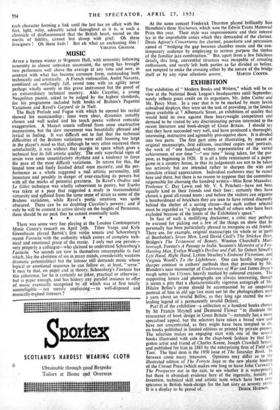MUSIC
AFTER a barren winter at Wigmore Hall, with nonentity following nonentity in almost unbroken succession, the spring has brought two performers well above the average at any time and now, in contrast with what has become common form, outstanding both technically and artistically. A French violoncellist, Andre Navarra, combined an unfailingly full, round tone with an agility never perhaps wholly seemly in this grave instrument but the proof of an extraordinary technical mastery. Aldo Ciccolini, a young Neapolitan pianist, asked to be judged by the highest standards, for his programme included both books of Brahms's Paganini Variations and Ravel's Gaspard de la Nuit.
The Bach Prelude and Fugue with which he opened his recital showed his musicianship ; lines were clear, dynamics suitably chosen and well scaled and his touch poetic without romantic exaggeration. A Mozart sonata suffered from some unattractive mannerisms, but the slow movement was beautifully phrased and lyrical in feeling. It was difficult not to feel that the technical difficulties of the Brahms variations were still looming too large in the player's mind so that, although he very often mastered them satisfactorily, it was without that margin to spare which gives a technical feat its full artistic quality. The only superficial signs of strain were some unsatisfactory rhythms and a tendency to force the pace of the most difficult variations. In return for this, the limpid tone and finely finished detail were masterly, and the per- formance as a whole suggested a real artistic personality, still immature and possibly in danger of over-reaching its powers but with all the marks of potential greatness. In Ravel's Ondine and Le Gibet technique was wholly subservient to poetry, but Scarbo was taken at a pace that suggested a study in transcendental virtuosity and suffered from the same sense of strain as some of the Brahms variations, while Ravel's poetic intention was quite obscured. There can be no doubting Ciccolini's powers ; and if only he will be content to arrive slowly on the heights of Parnassus, there should be no peak that he cannot eventually scale.
There was some very fine playing at the London Contemporary Music Centre's -concert on April 24th. Tibor Varga and Kyla Greenbaum played Bartok's, first violin sonata and Schoenberg's recent Fantasia with the authority which comes of complete tech- nical and emotional grasp of the music. I only met one person— very properly a colleague—who claimed to understand Schoenberg's Fantasia. No sounds are now in themselves unacceptable (a fact which, like the abolition of sin in many minds, considerably weakens dramatic potentialities) but the listener still demands music whose logical or emotional sequence he can follow or, at least, " sense." It may be that, on paper and in theory, Schoenberg's Fantasia has this coherence, for he is certainly no joker, practical or otherwise ; but is paper enough, and has history any parallel instance to offer of music eventually recognised by all which was at first totally unintelligible — not merely unpleasing — to well-disposed and musically-trained listeners ? At the same concert Frederick Thurston played brilliantly lain Hamilton's three Nocturnes, which won the Edwin Evans Memorial Prize this year. Their style was impressionistic and their interest lay in the improbable antics which they demanded of the clarinet. Denis Apivor's Concertante for clarinet, pianoforte and percussion aimed at " bridging the gap between chamber music and the con- temporary audience by employing to serious purpose the timbre of the familiar jazz combination." But, apart from a few felicitous details4 this long, uneventful structure was incapable of arousing enthusiasm, and surely left both parties as far divided as before, not tempted to make the crossing either by the nature of the bridge
itself or by any ripae ulterioris amore. MARTIN COOPER.


































 Previous page
Previous page